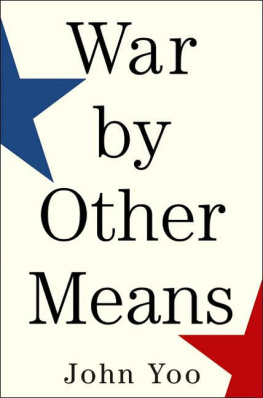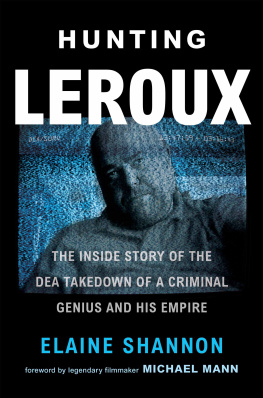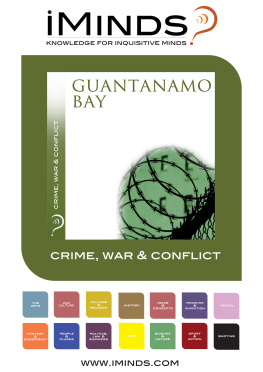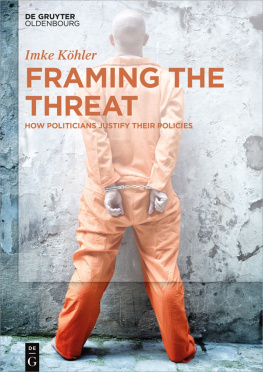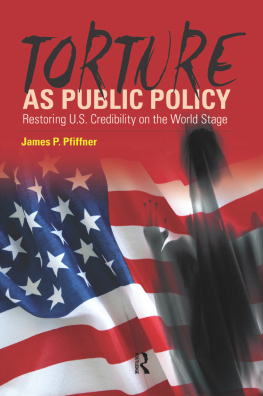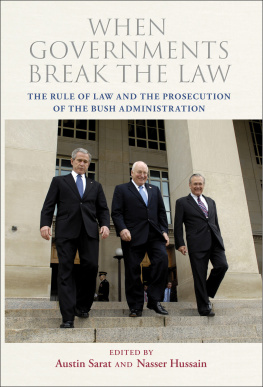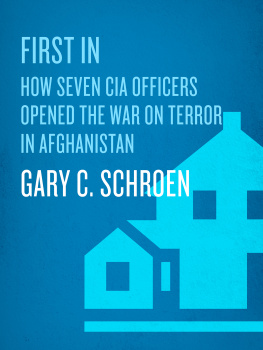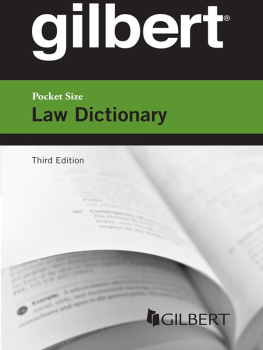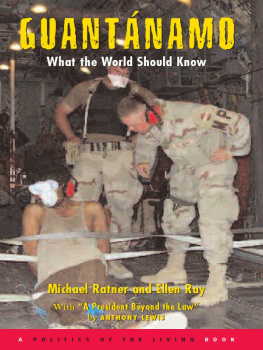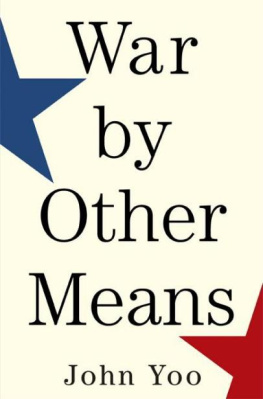WAR BY OTHER MEANS
Also by John Yoo
The Powers of War and Peace
WAR BY OTHER MEANS
AN INSIDER'S ACCOUNT
OF THE WAR ON TERROR
John Yoo

Atlantic Monthly Press
New York
Copyright (c) 2006 by John Yoo
All rights reserved. No part of this book may be reproduced in any form or by any electronic or mechanical means, or the facilitation thereof, including information storage and retrieval systems, without permission in writing from the publisher, except by a reviewer, who may quote brief passages in a review. Any members of educational institutions wishing to photocopy part or all of the work for classroom use, or publishers who would like to obtain permission to include the work in an anthology, should send their inquiries to Grove/Atlantic, Inc., 841 Broadway, New York, NY 10003.
Library of Congress Cataloging-in-Publication Data
Yoo, John.
War by other means / John Yoo.
p. cm.
Includes bibliographical references.
ISBN: 978-1-55584-763-0
Terrorism--Government policy--United States.2. War on Terrorism. 2001-3. War and emergency powers--United States. I. Title.
HV6432.Y66 2006
363.325'15610973--dc22
2006048972
Atlantic Monthly Press
an imprint of Grove/Atlantic, Inc.
841 Broadway
New York, NY 10003
Distributed by Publishers Group West
www.groveatlantic.com
CONTENTS
INTRODUCTION
A lmost every day brings some new revelation in the war on terrorism, from tales of mistreatment of al Qaeda detainees held at the U.S. Naval Base at Guantanamo Bay, Cuba, to the National Security Agency's wiretapping of suspected terrorist calls into the United States without a warrant, to the Supreme Court's June 2006 Hamdanv. Rumsfeld decision rejecting military commission trials for terrorists. And every day brings some new confusion, exaggeration, or misinformed attack on the government's policies. This book, which draws from my time as an official in the Office of Legal Counsel of the Department of Justice from the summer of 2001 to 2003, seeks to explain the choices that the Bush administration made after 9/11.
These decisions were controversial because the events of 9/11 itself were unprecedented, which forced our government to reexamine old assumptions, to reconsider policies, and to rededicate itself to protecting the national security against a new foe. American policies to stop al Qaeda have come under enormous attack in the media, the academy, and abroad. In this book I explain that these policies were the result of reasonable decisions, made by thoughtful people in good faith, under one of the most dire challenges our nation has ever faced. The war with al Qaeda has presented difficult and close calls, and no doubt another administration might have reached different answers, but overall these decisions have been successful in preventing another 9/11-type attack on the United States.
Two mutually antagonistic parties have created the controversy today over terrorism policy. On one side, human rights advocates, academics, and pundits fear that the Bush terrorism policy will amount to the second coming of Richard Nixon. They view detention or wiretapping programs not as protecting the country from further attack, but as attempting to infringe on civil liberties or spy on innocent Americans. They believe that the methods and rules of the pre-9/11 world will work against post-9/11 terrorism. It is a view understandably colored by the lens of Vietnam and Watergate, which saw the greater threat to freedom coming from our own government rather than a foreign foe.
The other responsible party has been the Bush administration. It has often failed to explain clearly to the public the difficult decisions al Qaeda has forced upon us. Do we adopt aggressive measures against terrorists or allow the chances of another al Qaeda attack to increase? No one in the government wanted to make these choices; they were thrust upon us by the 9/11 attacks. When I joined the administration in the summer of 2001, I never anticipated having to detail the precise meaning of torture in military and intelligence interrogations, or the use of wiretapping to track down terrorists within the country.
Upon confrontation and questioning of its policies, the Bush administration tended to run and hide. It allowed itself to be done in by leaks, and neglected to defend the hard choices it had to make. It allowed the most partisan and acrimonious critics to frame public understanding of terrorism policies.
One controversy that surrounded me--the withdrawal of the legal opinions having to do with interrogation techniques--was really just about politics. A new memo offered in substitution changed little in actual administration policy. Its purpose was to give the White House political cover by making the language more vague, and thus, presumably, more politically correct. It harmed our ability to prevent future al Qaeda attacks by forcing our agents in the field to operate in a vacuum of generalizations. Our intent in the Justice Department's original research was to give clear legal guidance on what constituted "torture" under the law, so that our agents would know exactly what was prohibited, and what was not. It is unfortunate, in my view, that this political game had to be conducted at the expense of our men and women in the field.
On the surveillance issue, the Bush administration had learned, to its credit, a few lessons from the torture controversy. It came out with a full legal justification of its actions. Here it has so far prevailed. Both policies were part of a common, unifying approach to the war on terrorism, which I attempt to explain in this book. It was the willingness of the administration to explain the NSA program that made all the difference.
Because of the Bush administration's reticence, a great deal of media attention has fallen on me and my views. Given my position in the government, I did not expect to be involved in many important decisions. My field of research and writing in the university world was war. Unlike others in the Justice Department at the time of 9/11, I had read about military commissions under the Lincoln administration, I knew how foreign surveillance worked, and I had written several studies on the balance of power between the President and Congress in war and foreign affairs. I had not expected to be too busy, because the Bush Justice Department--like the administration generally--focused primarily on a domestic agenda.
Much of the attention on me is due to the fact that there are few Bush administration veterans who will defend their decisions in the war on terrorism in public. Some inside and outside the administration have chosen to fall silent out of lawyerly discretion, lack of time or energy, or fear of partisan attack. Others have tried to engage in a series of self-serving leaks intended to distance themselves from those decisions. I decided to explain the choices made by the Bush Administration in the very first months of the war.
This was not a role I had ever wanted to play. I came to the government having served in the judicial branch as a law clerk for Federal Appeals Court Judge Laurence Silberman and for Justice Clarence Thomas on the Supreme Court. In the legislative branch, I had served as general counsel of the Senate Judiciary Committee under Senator Orrin Hatch of Utah. As an immigrant to this country, I welcomed the opportunity to serve the nation that had so generously allowed me to join it, and afterward return to academia to continue working on constitutional and international questions. The last thing I wanted to do was devote my career to the study of the issues surrounding terrorism.
I thought we had made the right calls at the time. It was a period when government leaders had to make some tough decisions under demanding conditions. Men and women who put their lives on the line in this war had to carry them out. I feel an obligation to them to explain why they were asked to do what they did and why it was the right thing to do. I served in the government with a number of excellent public servants, both Bush appointees and career civil servants, and I am proud to explain their work. The political and personal criticism of me, I admit, has proven unpleasant at times, ranging from protests at the law school where I teach to outrageous accusations in the press or at public events. But any unpleasantness counts for very little compared with the risks that our soldiers and intelligence officers must undergo to protect our country.
Next page
